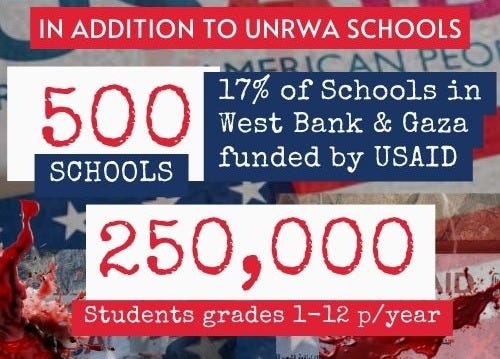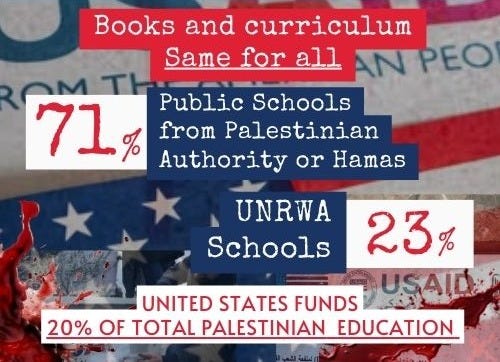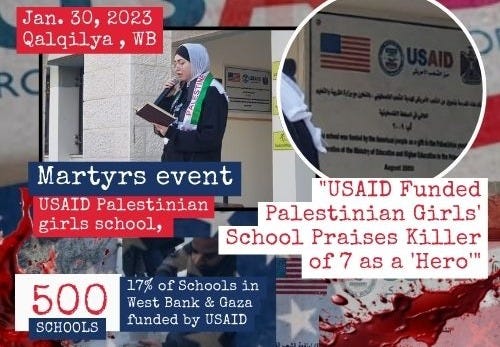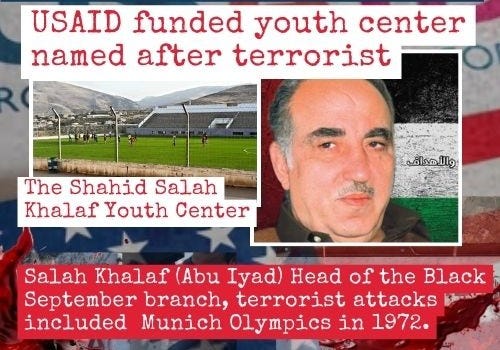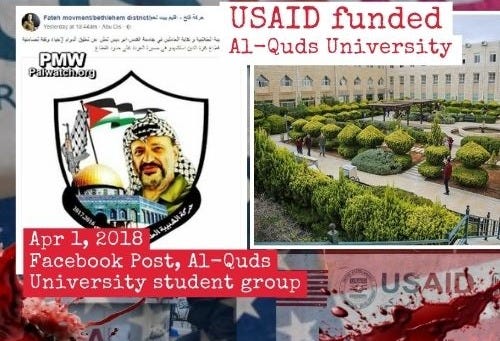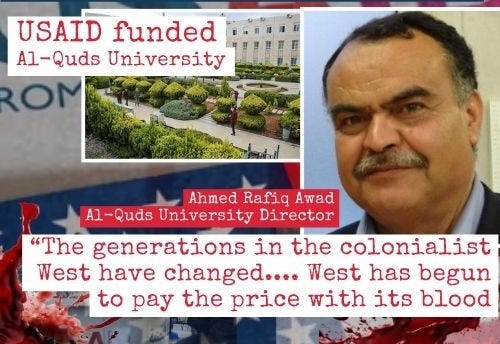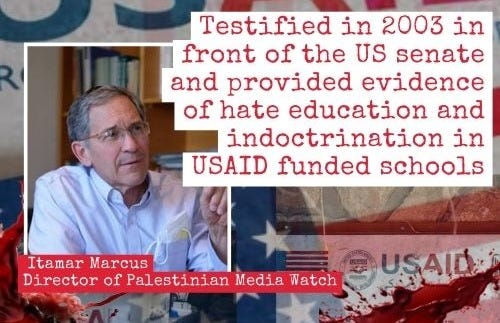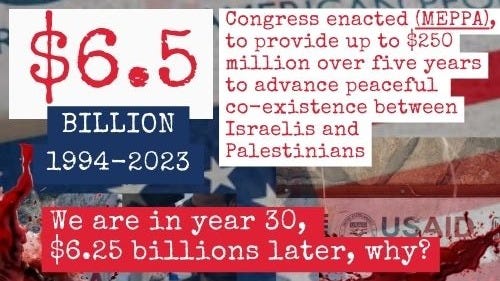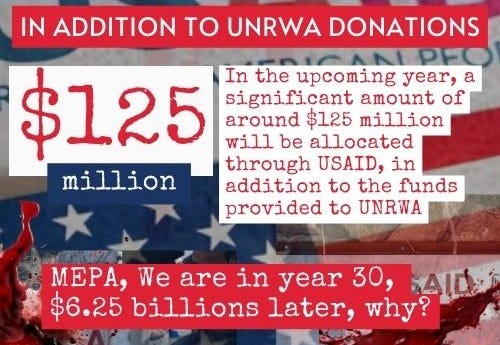USAID Education of Terror, From the American People
Teaching that martyrs are “heroes” of Palestinian society
The recent shutdown of USAID under President Trump highlights the growing concerns surrounding the effectiveness and accountability of U.S. foreign aid. One of the most troubling aspects of USAID's operations is the fact that, despite billions in donations around the world, it is estimated that less than 10% of the funds actually reach the people in need. A glaring example of the misuse of tax payer dollars, disguised as aid, is the education system in Gaza and the West Bank, where U.S. taxpayer dollars have been funneled into institutions that promote terrorism and hate.
USAID has been financing schools and universities in Gaza and the West Bank since the 1990s, and the consequences are deeply troubling. U.S. taxpayer dollars have being funneled into an education system that not only promotes terrorism and hate but actively glorifies martyrs and terrorists. These institutions, some named after notorious terrorists, hold events celebrating violence and martyrdom. The curriculum, echoing the hate-driven ideology of UNRWA, instills children with a dangerous narrative of violence, terrorism, and hatred.
Quarter of a Million Children Educated with Hate with US Funds Outside of UNRWA Schools
USAID (United States Agency for International Development) has played a crucial role in supporting education to Arab-Palestinians, contributing to 17% of non-UNRWA schools, educating approximately 250,000 children. However, the impact of this funding goes beyond mere numbers. While USAID's support includes building schools, training teachers, and providing essential resources like computers, projectors, and renovations, there are troubling aspects to consider. The curriculum and environment in these schools, are proven to be promoting hate, glorifying terrorism, and martyrdom.
Hate Education in Palestinian Schools Extends Beyond UNRWA
A staggering 71% of overall schools in Gaza and the West Bank are either run by Hamas or the Palestinian Authority (PA). These schools, which form the majority of the education provided to Palestinians, share the same curriculum and textbooks, perpetuating narratives of hate, violence, and martyrdom. UNRWA schools make up 23% of the total schools in the region, most located in Gaza where around 80% of the schools are UNRWA schools. USAID (United States Agency for International Development) is a major contributor to education for Arab-Palestinian, financing 24% of public schools and 33% of UNRWA schools. In total, USAID contributes to 20% of all education to Arab-Palestinians, promoting hate and using tax dollars for programs that fuel extremism and terrorism.
Eulogizing Terrorists in USAID-Funded Palestinian Schools
A particularly disturbing example is the Al-Omariya High School for Girls in Qalqilya, West Bank, which received USAID funding. On January 30, 2023, the school posted a celebration of Khairy Alqam, a terrorist responsible for murdering seven people, including Israelis and a Ukrainian national, outside a synagogue. The school’s Facebook post glorified Alqam as a “hero,” with the USAID logo visible in the background, raising concerns about the link between U.S. funding and the glorification of terrorism. This isn’t an isolated case, as similar instances of terror glorification have been documented at other USAID-funded institutions.
USAID-Funded Youth Center Named After Terrorist Leader
A youth sports center, funded in part by USAID, named after Salah Khalaf, the head of the infamous Black September terror organization, responsible for the Munich Olympics Massacre, should have raised serious concerns and highlights the glorification of terrorism embedded in US funded initiatives for youth beyond the classroom. The Martyr Salah Khalaf Center, named by the Palestinian Liberation Organization's (PLO) Higher Council for Youth and Sport, is located in Nablus and was constructed using USAID funds. This center, once the Al-Faria Prison, now bears the name of a terrorist responsible for orchestrating deadly attacks, including the Munich Olympics massacre. Images within the center showcase Salah Khalaf alongside Yasser Arafat and Mahmoud Abbas, further emphasizing the troubling nature of glorifying terrorism within spaces funded by international aid, including USAID. Salah Khalaf, also known as Abu Iyad, played a pivotal role in Fatah and was the mastermind behind heinous acts of violence, such as the murder of 11 Israeli athletes at the Munich Olympics in 1972 and the killing of two American diplomats in Sudan in 1973.
USAID’s Influence: From Grade Schools to Universities, Glorifying Martyrs
USAID’s influence extends beyond grade schools into universities, where the glorification of martyrs and terrorism continues. At An-Najah University, a USAID-funded institution, exhibits have glorified female suicide bombers and terrorist acts, including bus bombings. Similarly, USAID funds universities like the Islamic University in Gaza, which has ties to Hamas. The continued glorification of terrorism at these institutions, both at the school and university levels, perpetuates a culture of violence and extremism. USAID and other donors must ensure their funding is used to promote critical thinking, peaceful coexistence, and nonviolent ideologies, rather than supporting institutions that glorify violence and martyrdom.
Another example is how at a USAID-funded Al-Quds University, a student group has promoted images and narratives that glorify terrorism. The group’s use of imagery such as assault rifles and maps depicting Israel as “Palestine” raises concerns about the misuse of educational platforms to promote political and ideological agendas.
Extremist Ideology in USAID-Funded Universities Extend to Academia
The statements by Ahmed Rafiq Awad, Director of the Jerusalem Research Center at Al-Quds University, illustrate the propagation of extremist ideologies within academia at institutions receiving USAID funding. On Palestinian Authority TV, Awad made statements that blamed the West for the consequences of Israel’s actions, framing the West as complicit in alleged injustices. Such views undermine the role of universities as centers for learning and critical thinking. When academic leaders spread violent rhetoric, it should have raised questions about the misuse of USAID funding for educational purposes.
USAID: Sponsoring Hate Education for Decades
In a 2003 U.S. Senate hearing, Itamar Marcus of Palestinian Media Watch revealed the Palestinian Authority’s systematic use of education to promote hatred, glorify death for Allah (Shahada), and turn terrorists into heroes. Schools, cultural events, and summer camps named after terrorists like Ayyat Al-Akhras and Wafa Idris glorified acts of terror. Shockingly, some of these initiatives were funded by organizations like USAID, showing how foreign aid can contribute to spreading violence and extremism. Marcus called for an end to funding that promotes hate and for reforms to promote peace, such as renaming the over 70 institutions named after terrorists.
The MEPPA Program’s Legacy and Lingering Questions
Since the enactment of the Nita M. Lowey Middle East Partnership for Peace Act (MEPPA), the U.S. has allocated over $6.5 billion in aid. Originally intended to promote peace and coexistence, MEPPA’s funding has extended for more than 25 years, raising concerns about the long-term impact of such aid. Despite the program’s aim, education funded by MEPPA continues to promote extremist ideologies. This program should have expired in 2000 and the prolonged duration raises serious questions, especially considering the promotion of hate education in Palestinian education.
Unmasking USAID Funding: Fueling Hate in Education Initiatives
Before the shutdown of USAID, it had allocated around $125 million for educational initiatives for the coming years, in addition to what was allocated as contributions to UNRWA, now frozen. However, some institutions supported by USAID are known to promote hate and extremism.
For decades, American taxpayers have been supporting an education system that breeds extremism and violence, beyond UNRWA schools. With the full knowledge of elected officials and federal agencies, the U.S. continues to finance institutions that perpetuate these dangerous ideologies, all while Qatar directly and indirectly finances and controls U.S. education, where similar ideologies of hate and the embrace of terrorism are spread in U.S. soil. This raises a critical question: why would the U.S. support education that promotes terrorism and hate? Why would the U.S. be financing institutions that perpetuate ideologies fueling violence and conflict, while Qatar exercises control over U.S. education with similar agendas? It is all deeply troubling and irresponsible.
Qatar-Funded Indoctrination in America’s Public Schools
In June 2024, Chris Rufo, from City Journal, exposed a collection of publicly accessible documents compiled by the Portland Association of Teachers, an affiliate of the state teachers’ union that encourages its more than 4,500 members to “Teach Palestine!.” More troubling revelation is how radical and anti-American ideologies are infiltrating U.S. publi…




